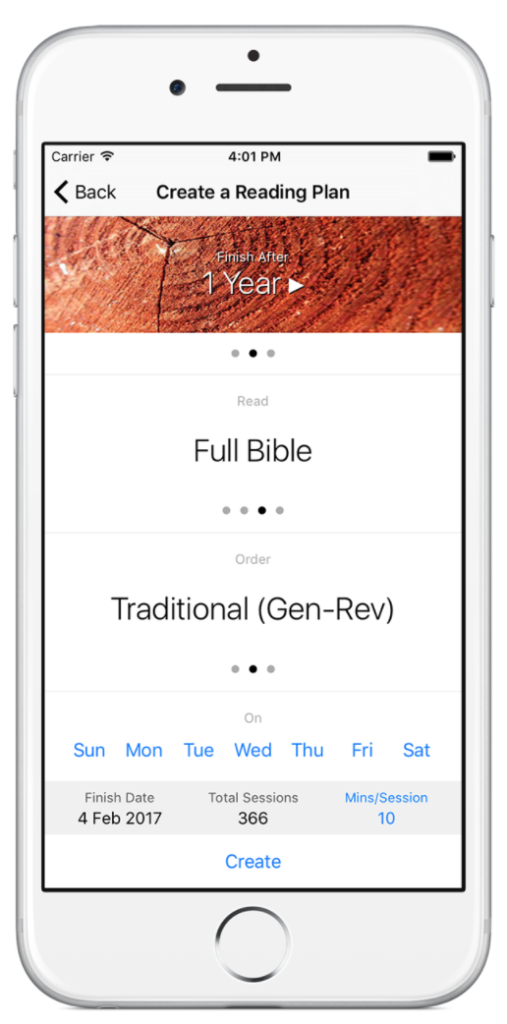Tools for Bible Study

"The most important thing in the world is daily, diligent, prayerful study of the divine word."
James A. Harding
We encourage Christians to read the Bible daily, and to follow a plan to read through it every year. This page holds various resources to help you develop a daily habit of engaging with Scripture, along with inspiring examples of Christians from the past who devoted themselves to Bible study out of devotion to God.
There are many excellent Bible reading plans available to help you read through the entire Bible regularly. These help you have daily assignments and allow you to track your progress. Here are a few plans and tools we have found helpful.
Read Through the Bible in a Year - Alternating Between Old and New Testaments
This plan starts in Genesis, then alternates between New Testament and Old Testament books so that you are consistently in both testaments throughout the year. This tool is in Microsoft Excel. To make this work, you must download the file to your own computer. Then you can customize the plan by adding your own start date, which will then assign dates to all the daily reading assignments. Find it hard making it through in one year? That’s okay. We have found this plan helps us read much more of the Scriptures than we had before. (You can also reset the start date!)
Read Through the Bible in a Year - Orthodox Study Bible Version
This plan is similar to the one above, except that this plan will take you through the entire Orthodox Study Bible in one year. The Orthodox Study Bible (OSB) uses the Septuagint for the Old Testament text, which includes the Deuterocanonical books accepted by the Orthodox Churches. While some believe the Deuterocanonical books are inspired by the Holy Spirit and others do not, reading through them provides excellent insight into a part of Israel’s history not covered in most modern protestant translations (the books were written between 283–246 BC). The Deuterocanonical books are also referenced extensively in the New Testament. Many in our congregation have been greatly encouraged by their study of the Septuagint! For more information about the Septuagint, this interview of David Bercot provides a helpful overview.
A Lamp Unto (Bible Reading Plan App)
Download A Lamp Unto (available on Apple and Android devices)
This app lets you create your own customizable reading plans. You can set 1) the number of years, months, weeks or days you want to read through the scriptures, or the number of chapters, verses or minutes you want to read each day; 2) read in the traditional order, chronological order, or a rotation through different Biblical books, and 3) the number of days of the week you want to commit to your through the Bible study. It will even provide you with statistics to show you how you are doing against your plan. If you get behind or get ahead, you can easily adjust the schedule to get caught up or shorten future readings so your end date is the same. You can also invite a friend to read through the same plan with you.

The first and most important duty of men, or rational beings, is to make themselves acquainted with the author of their existence, his character and attributes, his wills and laws, and what he enjoins us to do or forbear. Of God’s character we may obtain some imperfect notions from his works, from the world in which we live, its structure, its productions, the arrangement of its parts, and the adaptation of each part and every production to its proper use. Our views of the Creator may be still further extended by surveying the heavens, and the harmony of the whole system of worlds. These give us exalted ideas of the Creator.
Source: Value of the Bible, Noah Webster, Durrie & Peck, New Haven, 1834.
But we must resort to revelation for the more accurate knowledge of God; his attributes; and especially his moral government, in which we are most essentially concerned. In the scriptures only can we obtain a knowledge of God’s spiritual essence, his purity, holiness, truth, justice and benevolence. In the scriptures only can we learn for what purpose we were made, what God requires us to be and to do, to obtain his favor and protection in this life, and what is to be our fate after death.
…The will and commands of God are revealed in the scriptures, with so much clearness, that every person of common understanding may learn from them what he is to perform, and what he is to forbear doing. Hence the first business of men is to read the scriptures, and learn the character and will of God and their own duties.
James A. Harding lived from 1848-1922. When Harding died, R.H. Boll eulogized his mentor as "one who set more people to reading the Bible than any other preacher; and he infused his own love and appreciation for the Word into those who came under his sway." Harding encouraged daily reading of three and a third chapters of the Bible as a spiritual discipline in order to read the entire Bible in one year. He formed Bible reading classes wherever he went as an itinerant evangelist and collected "Bible reading cards" which detailed commitments and progress. He believed that "the chief duty of the teacher in the Church [is] to lead people to the daily, diligent, prayerful study of the Word" and he devoted more time and energy to that one point than to any other.
Harding saw the goal of daily Bible reading as relational, exposing us to the mind of God in Scripture so that we can be shaped into the image of Christ. He said that since "God is the author of the Bible, we should read it that we may know him." Harding practiced what he preached. In 1914 he said that he had read the Old Testament through sixty times, and the New Testament one hundred and thirty times.
Source: Kingdom Come, Hicks J.M. & Valentine, B., Leafwood Publishers, Abilene, TX, pp. 80-82
John Chrysostom lived between 349-407 A.D. The following quotes are taken from his Homily 32 on John, where he is discussing John 4:20 and the verses that follow. He encourages his listeners to take their Bibles off their shelves and read them, and challenges us to spend more time engaging in the Word of God and in spiritual battle than in worldly entertainments and pleasures.
...they tie up their books, and keep them always put away in cases, and all their care is for the fineness of the parchments, and the beauty of the letters, not for reading them. For they have not bought them to obtain advantage and benefit from them, but take pains about such matters to show their wealth and pride. Such is the excess of vainglory. I do not hear any one glory that he knows the contents, but that he has a book written in letters of gold. And what gain, tell me, is this? The Scriptures were not given us for this only, that we might have them in books, but that we might engrave them on our hearts. …
And this I say, not to prevent you from procuring Bibles, on the contrary, I exhort and earnestly pray that you do this, but I desire that from those books you convey the letters and sense into your understanding, that so it may be purified when it receives the meaning of the writing. For if the devil will not dare to approach a house where a Gospel is lying, much less will any evil spirit, or any sinful nature, ever touch or enter a soul which bears about with it such sentiments as it contains. Sanctify then your soul, sanctify your body, by having these ever in your heart, and on your tongue. For if foul speech defiles and invites devils, it is clear that spiritual reading sanctifies and draws down the grace of the Spirit.
... Is it not strange that those who sit by the market can tell the names, and families, and cities of charioteers, and dancers, and the kinds of power possessed by each, and can give exact account of the good or bad qualities of the very horses, but that those who come hither should know nothing of what is done here, but should be ignorant of the number even of the sacred Books? If you pursue those worldly things for pleasure, I will show you that here is greater pleasure. Which is sweeter, tell me, which more marvelous, to see a man wrestling with a man, or a man buffering with a devil, a body closing with an incorporeal power, and him who is of your race victorious?
These wrestlings let us look on, these, which also it is seemly and profitable to imitate, and which imitating, we may be crowned; but not those in which emulation brings shame to him who imitates them. If you behold the one kind of contest, you behold it with devils; the other, with Angels and Archangels, and the Lord of Archangels. Say now, if you were allowed to sit with governors and kings, and to see and enjoy the spectacle, would you not deem it to be a very great honor? And here when you are a spectator in company with the King of Angels, when you see the devil grasped by the middle of the back, striving much to have the better, but powerless, do you not run and pursue after such a sight as this? ‘And how can this be?’, says someone. If you keep the Bible in your hands; for in it you shall see the lists, and the long races, and his grasps, and the skill of the righteous one. For by beholding these things you shall learn also how to wrestle so yourself, and shall escape clear of devils.”
John Chyrsostom, Homily 32 on John